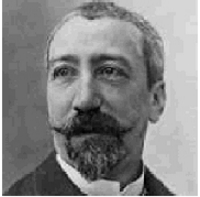Anatole France
Jacques Anatole François Thibault | |
|---|---|
 Jacques Anatole François Thibault | |
| Born | 16 April, 1844 Paris |
| Died | Template:Euro death date and age Tours |
| Pen name | Anatole France |
| Occupation | Novelist |
| Genre | Novel |
| French and Francophone literature |
|---|
| by category |
| History |
| Movements |
| Writers |
| Countries and regions |
| Portals |
Anatole France (April 16, 1844 – October 12, 1924) was the pen name of French author Jacques Anatole François Thibault. He was born in Paris, France, and died in Tours, Indre-et-Loire, France.
Biography
The son of a bookseller, he spent most of his life around books. His father's bookstore was called the Librairie de France and from this name Jacques Anatole François Thibault took his nom-de plume. Anatole France studied at the Collège Stanislaus and after graduation he helped his father by working at his bookstore. After several years he secured the position of a cataloguer at Bacheline-Deflorenne and at Lemerre, and in 1876 he was appointed a librarian for the French Senate. Ironic, skeptical, he was considered in his day the ideal French man of letters. He was elected to the French Academy in 1896 and was awarded the Nobel Prize for Literature in 1921.
Career
Anatole France became known after the publication of Le crime de Sylvestre Bonnard (1881) where he looked back at the 18th century as a golden age. Its protagonist, skeptical old scholar Sylvester Bonnard, embodied France's own personality. The novel was praised for its elegant prose and won him a prize from the French Academy. In La rotisserie de la Reine Pedauque (1893) Anatole France ridiculed belief in the occult; and in Les opinions de Jerome Coignard (1893), France captures the atmosphere of the fin de siècle.
France's later works include L'Île des Pingouins (1908) which satirizes human nature by depicting the transformation of penguins into humans - after the animals have been baptized in error by the nearsighted Abbot Mael. La Revolte des Anges (1914), often considered France's most profound novel, tells the story of Arcade, the guardian angel of Maurice d'Esparvieu, who falls in love, joins the revolutionary movement of angels, and toward the end realizes that the overthrow of God is meaningless unless in ourselves and in ourselves alone we attack and destroy Ialdabaoth.
In the 1920s France's writings were put on the index of Libri prohibiti.
Works, partial list
- Penguin Island, L'Île des Pingouins
- The Crime of Sylvestre Bonnard, Le Crime de Sylvestre Bonnard
- Thaïs
- Le jongleur de Notre Dame
- The Human Tragedy, L'Humaine Tragedie
- The Queen Pedauque, La Rotisserie de la Reine Pedauque
- The Red Lily, Le Lys Rouge
- The Revolt of the Angels, La Revolte des Anges
- Crainquebille; Putois; Riquet; et Plusieurs Autres Recits Profitables
- Les Sept Femmes de la Barbe-Bleue et Autres Contes Merveilleux
- Monsieur Bergeret a Paris
- Sur la Pierre Blanche
- The Man Who Married A Dumb Wife play
- The Gods Are A-Thirst, Les Dieux ont Soif
- The Life of Joan of Arc 2 volumes
- Mother of Pearl
Famous sayings
- "Those who don't count, won't count."
- "Until one has loved an animal, a part of one's soul remains unawakened."
- "I prefer the folly of enthusiasm to the indifference of wisdom."
- "The law, in its majestic equality, forbids rich and poor alike to sleep under bridges, to beg in the streets, and to steal their bread."
- "To accomplish great things, we must not only act but also dream, not only plan but also believe."
- "Irony is the gaiety of reflection and the joy of wisdom."
- "Wandering re-establishes the original harmony which once existed between man and the universe."
- "For every monarchy overthrown the sky becomes less brilliant, because it loses a star. A republic is ugliness set free."
- "She fought him off vigorously, scratched, cried that she will die before she submits, but the chevalier paid no attention to her words and took her. Afterwards, she smiled coyly and told him: “Do not think, dear chevalier, that you won me against my will. Better thank our good preacher who reminded me that we are mortal, and a pleasure missed today is missed forever. Now we can proceed, for I missed too many pleasures while being too prudent for my own good”. (Fable by Anatole France.)
Misattributed
- "If fifty million people say a foolish thing, it is still a foolish thing." (A misquote derived from a piece of writing by W. Somerset Maugham.)

